When Hiren Gandhi’s friend and former classmate from SP Jain Institute of Management and Research, Shalabh Mittal, called him to discuss the concept of ‘capsule’ or ‘pod’ hotels in 2014, Gandhi’s first reaction was of disbelief. He runs a successful chain of family-owned 4-star hotels in Gujarat called Express Hotels. The three properties — two in Vadodara and one in Jamnagar — are full-service hotels with amenities such as fitness centre and concierge. More importantly, his hotels have spacious rooms averaging 250 square feet in area. In contrast, ‘pods’ or capsule hotels have room sizes typically ranging between 50 and 90 square feet. Sleek, minimalistic and modern interiors make the best use of available space, and there’s no fancy furnishing. Naturally, the idea of making guests stay in a ‘capsule’ sounded odd to Gandhi.
But Mittal, who had the opportunity of staying in a pod hotel in Singapore during a work trip, was hugely impressed by its business model, service, safety and quality. On his insistence, Gandhi decided to visit a couple of pod hotels to get a first-hand experience. “I was immediately convinced that this is easy to emulate in India. There is a dearth of good quality accommodation at affordable prices in India,” says Gandhi.
The pod hotels, with its no-frills approach, seemed liked the perfect solution. With an initial investment of Rs.100 million, Gandhi and Mittal co-founded Urbanpod in 2015 and began groundwork to launch India’s first boutique pod hotel. Two years later, in March 2017, the company launched its first property in one of Mumbai’s busiest business districts, Andheri. Located on the first floor of Opus Park in Andheri East, Urbanpod comprises 140 ‘pods’ and a spacious cafeteria. Over the past 14 months, the concept has got off to a promising start, with steadily increasing footfall (see: Increasing traffic). It is not just pocket-friendly, but also offers world-class services. The hotel currently has an occupancy rate of 60%, and has till date served over 10,000 visitors from 40 countries. The founders, in fact, are confident of breaking even within the next two years, buoyed by the initial response.
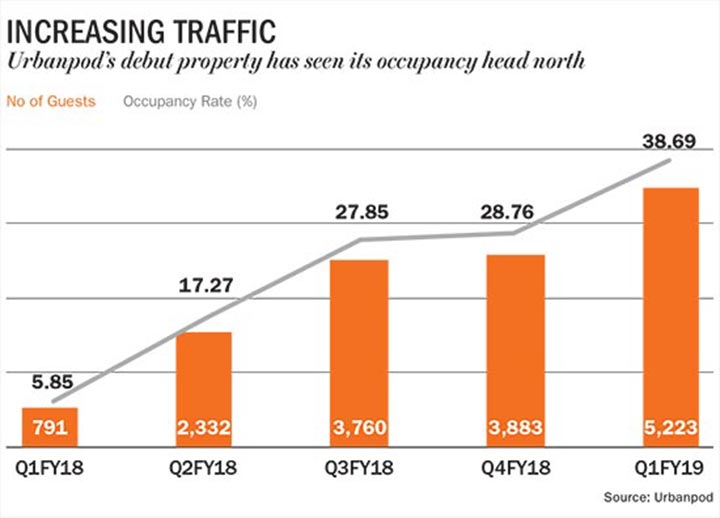
Nikhil Ganju, country manager, TripAdvisor India believes that while regular hotels would be the preferred choice for families, “the emergence of innovative stays such as Urbanpod are welcome entrants, as they give both solo and budget travellers more choice.”
The concept
Interestingly, the concept of pod hotels originated in Japan in 1979 with the Capsule Inn Osaka. Since then, it has slowly become popular across countries such as Singapore, China, Belgium and Iceland. In a report by WiseGuy Research Consultants, the global capsule hotels market was estimated at $159 million in 2016 and expected to reach $226 million by the end of 2022.
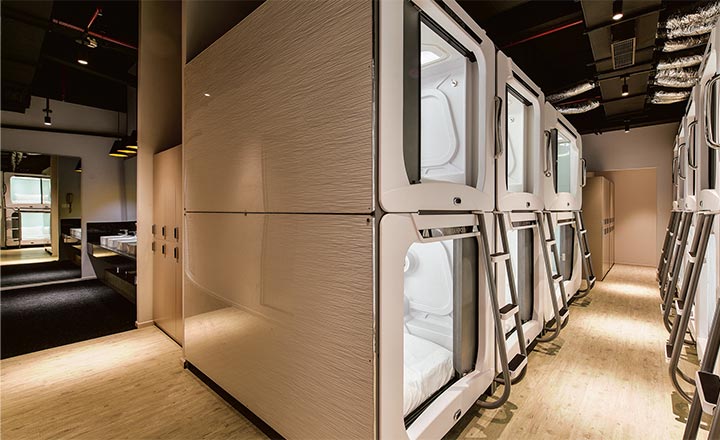
In India, though, not many knew of this. Gandhi says that this is why it took them a lot of time to convince the local authorities of the nature of accommodation. Finding real estate was also a challenge — they didn’t want a piece of land, but just floor space of about 10,000 sq ft. “We had to pick a central location with easy accessibility to the airport, railway and metro. Zeroing down on this location took us almost a year-and-half. The construction took barely seven months,” he adds.
Singapore-based architect and Gandhi’s business partner, Berlin Lee, lent his expertise in designing the space. Guests can choose between classic, private and suite pods, ranging from 50 square feet to 90 square feet in size, and priced between Rs.1,000 and Rs.3,000 per night. “We also introduced a ‘Ladies Only’ section with 18 pods to provide additional security and privacy to our female travelers,” says Gandhi.
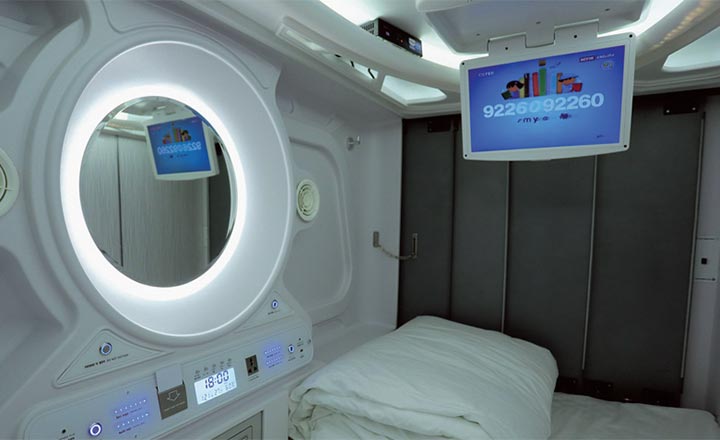
After checking-in at the reception, guests are handed a multi-purpose access card, headphones, television remote, towel and water bottle. They are then guided to a locker room to deposit footwear, before proceeding to their ‘pods’. Like other hotels, Urbanpod too has ‘rooms’. The 124 classic pods are organised in arrays — side-by-side and one-above, with 14 in each room, and individual sliding doors for privacy. The six private pods provide more room, and the 10 suite pods are ideal for double occupancy. The pods comprise a bed, surrounded by amenities such as a mini-locker, wifi, adjustable air-conditioning, lights, air purifier, a mirror and television.
One major contrast against regular hotels is that the luggage has to be stored in individual locker facilities outside the pod. There are no attached bathrooms — instead, there are about 23 common washrooms for the guests. This is a significant challenge in a country where ‘attached bathrooms’ are the norm, and where ‘common toilets’ are perceived to be ‘unhygienic’. Gandhi, though, counts this as initial skepticism. “When people call for reservations and do not entirely know who we are, we direct them to our website to help them understand the concept better. If we say rooms without bathrooms, it doesn’t quite fit with people’s ideas of convenience, but the inconvenience is not so much. People only realise it once they stay here,” explains Gandhi.
There is mild enthusiasm among frequent travellers when it comes to pod hotels. Mumbai-based entrepreneur, Hardik Somaiya, states that he would not mind trying out pod hotels if they expand to cities beyond Mumbai. Somaiya often travels to Delhi and Bengaluru for work, and ends up spending a lot on hotels. “A good hotel with facilities like Wi-Fi and breakfast end up costing about Rs.3,000 a night. But I have no option as I cannot do without these amenities,” he says. More than anything, it is the prospect of good services at affordable pricing that is attracting traveller interest.
That said, many are also skeptical about the ‘pod’ concept. Rashmi Sharma, a media consultant based in Delhi, states, “I am claustrophobic and would surely not prefer staying in such a small place, no matter how affordable it may be.”
Cheap and cozy
A majority of people opting to stay at Urbanpod are business travellers and backpackers looking for affordable accommodation. “These are typically people who do not spend much time at the hotel apart from eating and sleeping. We also get a lot of students stopping by for interviews or admissions. The age group is usually between 20-45,” says Gandhi.
Urbanpod is also not the only one eyeing this demographic. “In recent years, the budget hotel segment has grown exponentially. Alongside affordability, people seek safety, hygiene and cleanliness when booking a hotel. Ultimately, what sells the most is the option with the best value for money,” says Abhinav Sinha, COO, Oyo. Over the past decade, technology in the hospitality space has taken over. Oyo is catering to these new-age travellers through Oyo Rooms, Oyo Townhouse, Oyo Home and SilverKey.
Apart from Oyo, a number of new players have been entering this space over the past few years, with an aim to change people’s perception about budget hotels. Zostel, Basti, Moustache and The Backpackers Hostel are some of the most popular players in this space. Zostel, which is one of India’s first chain of backpackers’ hostels, has presence in 28 locations and enables travellers to choose between air-conditioned dormitories with bunk beds and private rooms at affordable rates. Jamshedpur-based Pod ‘n' Beyond, started by serial entrepreneur Ravish Ranjan, makes the business even more basic by accepting hourly bookings. It is one of the first few hotels in India to do so, and offers a barebone setting bereft of amenities like television or other comforts.
“There is a lot of opportunity within the accommodation space in India, and this is fuelling the demand for new, unconventional accommodation formats that offer interesting experiences,” says Ganju of TripAdvisor. His view is echoed by Akhil Malik, co-founder and CEO, Zostel, who believes that travellers stay with Zostel because of the cohesive overall experience, and not just because it is comparatively inexpensive. “Millennials, the biggest segment of travellers with big spending power, do not like to sit in an expensive room watching TV in a formal setting. They demand an authentic, local and memorable experience at affordable prices, which we aim to provide,” he says.
As a result of all this, travel is becoming more engaging, and within everyone’s reach. “You no longer have just the two options that you used to have five years ago — stay in an expensive property or opt for dingy, unhygienic guesthouses. The new lodging options will unravel the potential of this sector,” adds Malik. The traditional hotel industry is also coming to terms with this change, and to combat this threat, is coming up with smart, affordable lodging options. Accor has launched Jo and Joe, Marriott has launched Moxy and Hilton has launched Tru, to compete with such pod hotels.
Partner to grow
Gandhi and Mittal have a robust expansion plan to capitalise on its early-mover advantage in the pod hotel space. Their target is to have 800 pods in two years, across eight locations including Delhi NCR, Bengaluru and Chennai. The founders are looking to fund it through a franchise model, where a partner invests the capital and Urbanpod manages it. “The typical investment required is Rs.500,000 per pod, which translates to Rs.50 million for 100 pods. We would pay them a fixed return of 5% on total investment, annually. They would also get profit share of about 30%, when we turn profitable,” says Gandhi. Urbanpod is also looking to raise Rs.200 million from venture capitalists in the near future.
In addition to the standalone properties, Urbanpod is also exploring the possibility of introducing this concept at airports and railways. “The railways have floated tenders for renovation of retiring rooms in a couple of cities. Since we cannot bid directly, we are in talks with listed contractors to introduce the pods to rail travellers,” says Gandhi. They are presently working on four railway locations to cater to business travellers, and aims to expand to 35 stations in the next five years. They are also looking to tie-up with airports, to cater to travellers coming into the city for short duration stays.
“We also see a lucrative expansion opportunity at pilgrimage sites, where people seek a clean place to shower and relax,” says Gandhi. If the market demands it, they are open to exploring hourly packages as well. A lot is being planned, but only its execution will determine the success of concepts like Urbanpod. Gandhi’s initial disbelief has been replaced with strong optimism, and he believes that sooner or later, more people will warm up to the idea of pod-based short-stay hotels.




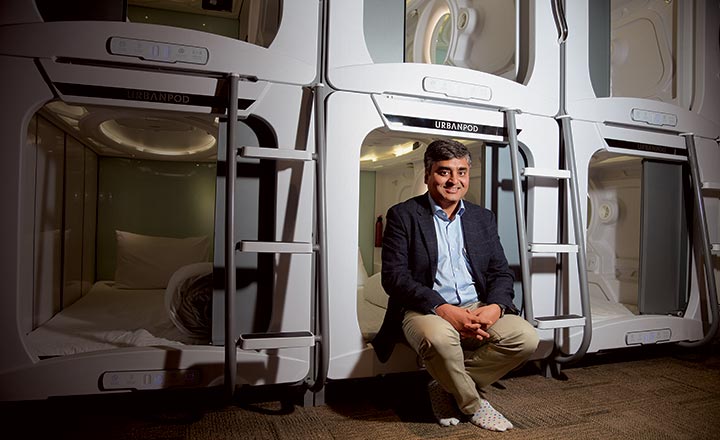





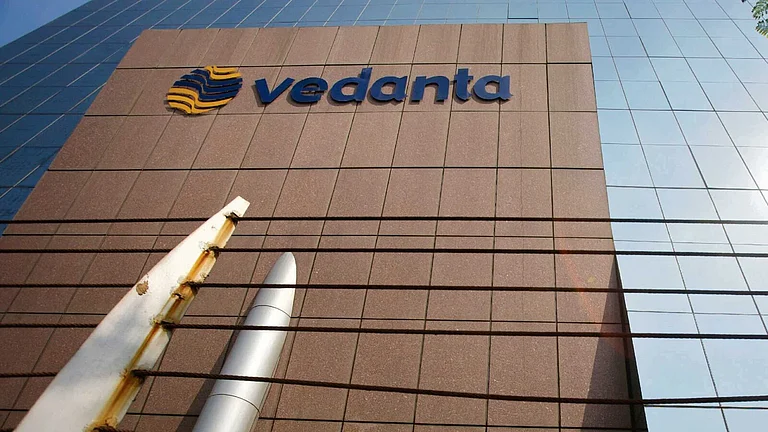

 Just one email a week
Just one email a week